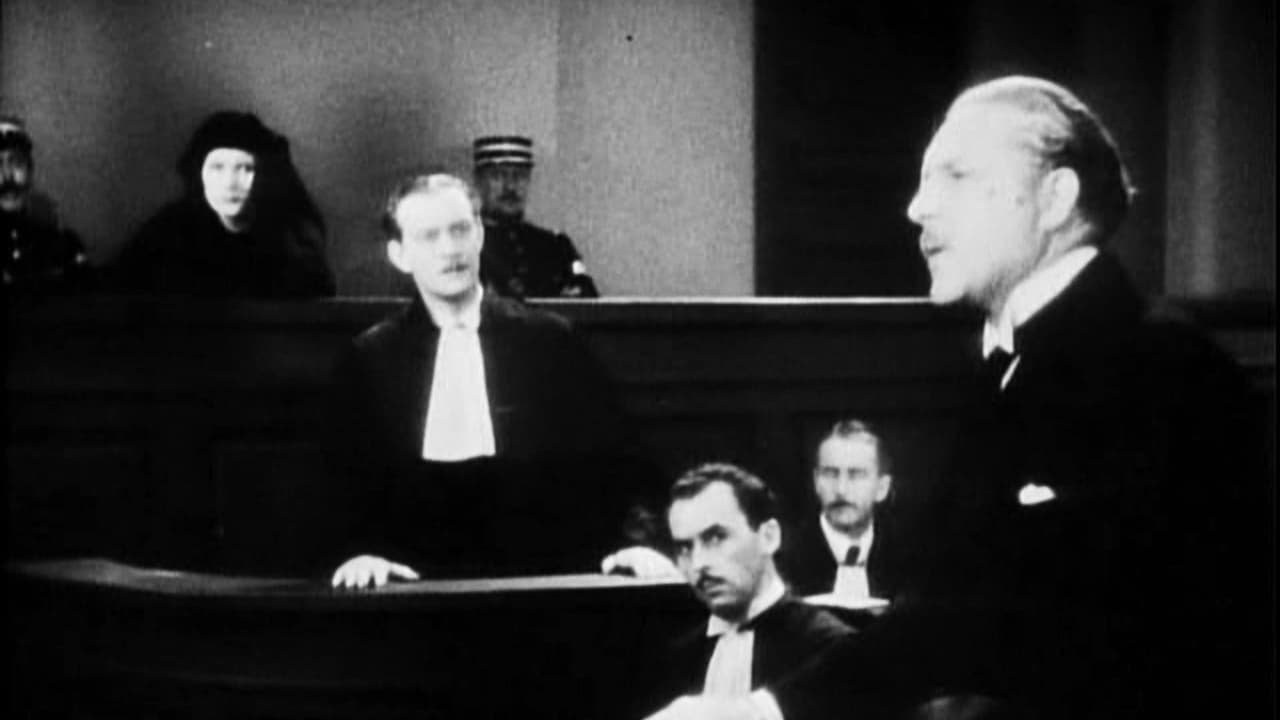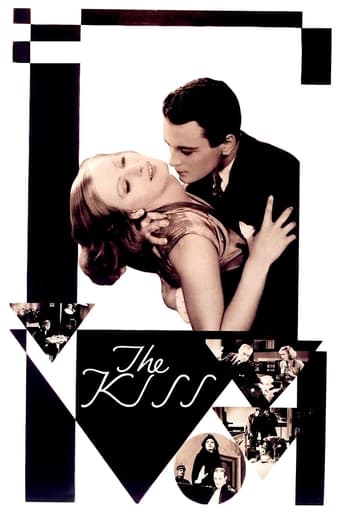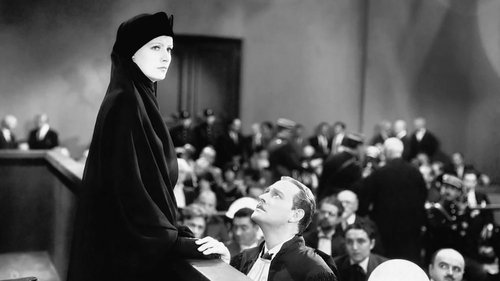


"The kiss" took the melodramatic accents of Feyder 's precedent work " Les Nouveaux Messieurs"and tightened them up;whereas that work should have been boiled down to a 90 min movie, "the kiss" depicts a tragedy in admirably succinct style :only 62 min,a very good screenplay which does not reveal the whole truth before the last minutes.It's the classic story of the divine lady married with a graybeard without love ,in love with a more handsome gent;add a young man,pretending to be a man (the subject of the immature young lad will come back later in Feyder 's career in " Pension Mimosas")and all the ingredients of a good melodrama are in it.In Hollywood,Feyder accurately depicted his native land:in jails for women ,the wardens were nuns (in 1960 ,in Clouzot's "La Vérité" ,Brigitte Bardot was guarded by sisters too);and the gendarmes' uniforms are exactly as they were.After this successful work (which owed a lot to G.Garbo in her last silent movie) ,Feyder was disappointed with the screenplays left for him to direct and he came back to his native land and produced his greatest achievements :"Le Grand Jeu" ,"Pension Mimosas" and his masterpiece "La Kermesse Héroique".
... View MoreI often see stills from this movie accompanying articles about art direction of the 1920s. Stressing the claustrophobic ceilings and the pointed triangular furniture where Irene (Garbo) lives with her husband (Anders Randolph) with whom she is caught in a loveless marriage, the extreme surroundings mirror their tense lives. MGM embraced the stark modernistic Art Deco style, their films were always aimed at the wealthier members of the audience or the poor audiences that envied the rich. The "average" MGM family of the 20s were usually wealthy, who lived in a mad whirl of parties, often taking place on yachts ("Our Dancing Daughters" is a good example).In my opinion, along with "A Woman of Affairs", this is my favourite Garbo film. It was her last silent - released late in 1929 and once again she gave a strong, mesmerizing performance even though the men in the movie (Conrad Nagel, Anders Randolph, Lew Ayres) lacked dynamism and at just over an hour an extraordinarily short running time for a Garbo film.Irene (Garbo) is having a very discreet affair with Andre (Nagel), she begs him to take her away but he is concerned for her reputation and wants to confront her husband, blustering, quick tempered Charles (Anders Randolph - yes Anders Randolph - how did that ever happen, was she in a daze until their honeymoon!!!) - who is not above having Irene tailed!! The only thing of interest the "trailer" has in his book is the amount of time Irene spends with young Pierre (Ayres) who just happens to be her messenger boy and dog handler. Unbeknownst to everyone Pierre is infatuated with Irene. Charles is on the verge of bankruptcy but LaSalle, Pierre's father offers to bail him out, however on the way to the meeting Charles suffers a slight heart attack and instructs his driver to return home. He walks right in on a playful kiss between Irene and Pierre but by the end of the evening Charles is dead and Pierre has staggered home, dishevelled and bloody.The last part of the movie has a couple of innovative sequences. When Irene is questioned by the detectives she is hesitant and changes her story, but the viewer sees it in flashback - are the windows open, no they are closed, what time was it - the clock hands go haywire and instead of 9.30 pm it is now 9.10 pm - she constantly stumbles, recollects and fabricates. At the trial (Andre has returned to represent her) her stark black Adrian designed hat almost turns her into an Art Deco decoration as she is photographed from below, sitting in the witness box.Lew Ayres made a spontaneous, eager Pierre. He was a protégé of Paul Bern and had had a bit part in "The Sophomore" but when Bern moved to MGM he thought of Lew for the role of the youthful Pierre in "The Kiss".
... View MoreAs a fan of Greta Garbo films, I consider each one of them highly entertaining and worth seeking out. The Swedish beauty could captivate the viewer in many of her roles to such extend that she was as popular in movie world as, much later, the Swedish band ABBA was in music world. Yet, when I talk to people who are quite knowledgeable about the early cinema, I usually encounter the opinion that Garbo films let them down. "She was such a dramatic lady," they say "she can still make us cry." Strange as it may occur, to some extend, this pretentious opinion may be found accurate, particularly when we consider the year 1939 and Garbo's first comedy NINOTCHKA made by Ernst Lubitsch. What a change, what a revelation it was! "A true transformation," some said and indeed, NINOTCHKA proved Garbo's talent in comedy (unfortunately forever bound to fail two years later in TWO FACED WOMAN). But few people know that Garbo had wonderfully modern roles in some other films, roles that can still make your day thanks to their charm and convincing portrayals. One of such films is THE KISS with original musical score, the last silent movie of Garbo and MGM directed by Jacques Feyder with whom Garbo worked later on the German version of "Anna Christie" with Salka Viertel. The uniqueness of THE KISS is the fact that it is very different from all other Garbo films.The kiss of 'good bye' that cost Irene Guarry (Greta Garbo) so much (which was metaphorically Garbo's farewell to silents) is the representation of all human struggles and desires. Simple as the short story may seem, when you watch the film carefully, you realize that the director aimed at conveying some important and a very up-to-date message for all of us: "Listen to your heart not the tyrants of conventions and misery of duties..." There is a bit of everything in the story: wit, romance, jealousy, pardoning... Consider, for instance, the sequence at the court where we get the masterwork of human situation, individual situation in the mute world.The film can boast terrific artistic merits with scenes of exceptional charm. Here, a mention must be made of the party at Lasalle, which again proves the glamor of the silent era. But, most things we can appreciate here are there thanks to the Swedish Sphinx... Garbo. The great Greta gives another brilliant performance in the lead but, as it has already been mentioned, her role differs from other of her silent roles in the way that Irene Guarry appears to be a particularly modern character as well as her story appears to be extremely appealing to modern audience. It is not as much her vehicle as the story which captivates certain viewers. That, however, does not mean that we easily forget the great actress whose presence illumines the moments and supplies them with unique power. There are exceptional shots of Garbo's face. Consider, for instance, the moment she looks at herself in the mirror. Perhaps not as great as the ultra famous moment in FLESH AND THE DEVIL but also highly worth attention. What a great beauty she was! So to speak, THE KISS is a very important movie in both Garbo's career and the history of MGM. It occurs to be a great farewell to the silent era, an interesting look at life situation filled with the affection that any kiss deserves... And for Garbo fans somewhere there in the world: a different look at the famous Swede, yet, unique and magnetic as always.
... View More"The Kiss" happens about midway into the movie ... Greta Garbo gives young admirer Lew Ayres a friendly kiss goodbye as he's about to leave town, Ayres, who cannot control his infatuation with the beautiful Garbo, goes in for another, less platonic kiss, at which point Garbo's husband sees them from afar and goes berserk. A fight amongst the three ensues, gets carried into another room where the door is shut to us, the audience, and we hear a shot. Garbo's husband is dead, but who did it? Prior to the "kiss" moment, we've seen Garbo and her lover (Conrad Nagel) in a torturous romance ... they both love each other madly but Greta doesn't see any way out of her loveless marriage. In the meantime, Lew Ayres follows Greta around like a puppy dog; he's an 18-year-old completely infatuated with the beautiful married lady.The latter half of the movie deals with the investigation of the husband's death, Greta's arrest, and her trial where she is defended by Nagel who in addition to being her former lover is also a lawyer.I won't give away the outcome of the trial, but I will say that the jury believes it is Person A who did it and after the trial we learn it was Person B.The musical score to this flick was absolutely horrible. I especially could have done without the "Romeo and Juliet" theme that was played every time the flick wanted to telegraph Greta's and Conrad's love to the audience.Despite the score, this was a very enjoyable silent movie. I find some silents tedious, others quite well done. "The Kiss" definitely falls into the latter category. Worth watching.
... View More